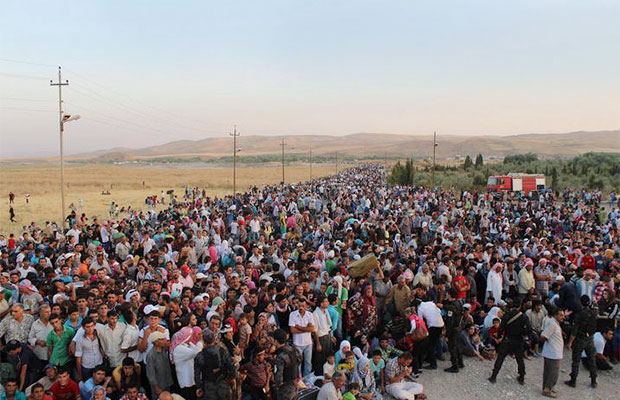
Committed to the Cause of Refugees
They’re crammed into the dark recesses of dubious ships like packed sardines. They’ve ransomed their futures to fund a voyage that may fail. And, should they reach the distant shores of a continent ill-equipped to accommodate them, they face a harsh reality: instead of asylum and a better life, they may become trapped in a purgatory of waiting — in refugee camps or “processing facilities,” on train platforms or in a no-man’s land outside closed borders. Ultimately, they may even be turned back.
They are the countless numbers of men, women and children — according to the United Nations High Commission for Refugees (UNHCR), close to a half million in the month of August alone — fleeing brutal violence and persecution in Syria, Iraq and elsewhere in the Middle East and Africa.
Heeding the call of Pope Francis, Salesian missionaries throughout Europe are working hard to assist those refugees in whatever way they can. “As we are faced with the tragedy … of refugees fleeing from death by war and hunger, and now traveling in hope of a new life, the Gospel calls us to be neighbors to the least and the abandoned,” says the Pope. “It is not enough to say ‘courage, patience!’”
Such practicality is driving the initial response of Salesian missionaries — which is to work with their local parishes, provinces and communities to identify ways to accept migrant families into their midst.
Already in Germany, eleven Salesian-run houses have accepted and are caring for 448 young unaccompanied minors between the ages of 16 and 18, most of whom have fled Afghanistan, Iraq, Syria and Africa. The children, mostly boys, live together in homes that accommodate 12; each home includes four social workers, to whom the boys have round-the-clock access. In order to ensure the highest levels of quality in care and living conditions, these social workers attend regular trainings at the Institute for Youth Ministry in Benediktbeuern — which emphasizes skills in the education of traumatized people and in interreligious competence.
"The pressure is great,” says Fr. Josef Grünner, provincial of the Salesian community in Germany. “For us, however, it is important that the refugees are cared for like all the other young people in our works. They must be helped within their means, with language courses and vocational qualifications. It is an advantage that they meet other young people. They eat together and spend their leisure time together. In this way, they learn to meet others and eventually become integrated.”
To meet the growing need in Germany, missionaries are also preparing additional housing for refugees, which they anticipate will be available sometime between October and January.
Similarly, the Salesian community in Italy is housing smaller numbers of young refugees while simultaneously preparing to accommodate many more. Since the beginning of July, the Don Bosco Institute in Alessandria has been caring for ten young refugees, offering holistic services to help prepare them for independence.
Says Father Domenico Ricca, coordinator of the Salesian response to refugees in Italy, “Our goal is not to accommodate large numbers, but small groups of young people or families and to help them to be integrated, primarily by helping them to learn the Italian language and then to start work, even if it is only temporary, with training courses, so that they can care for their own future.”
At the same time, the Salesian community throughout Europe — comprising priests, brothers, sisters, past pupils and volunteers — is examining collaborative, and systemic, approaches to address the immediate and long-term challenges posed by the crisis.And through it all, they remain focused on the people at the very heart of the crisis — the fathers, mothers, sons, daughters, brothers and sisters who seek nothing but the chance to start again.
“In the face of so much tragedy, we cannot remain indifferent,” says Salesian Rector Major Ángel Fernández Artime.
Our mission brings dignity and new hope to those fleeing violence and oppression around the world. What’s your mission?

